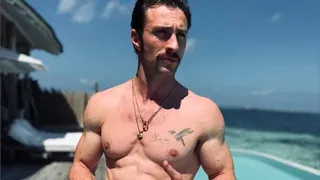
September 9, 2024
TIFF Dispatch 2: The World Comes to TIFF
C.J. Prince READ TIME: 8 MIN.
In my first TIFF dispatch, I expressed my surprise at how TIFF didn't seem to face much controversy in the weeks leading up to the festival. It only took the opening night of the festival for that sentiment to go down the drain, when the screening of the opening night film was interrupted by several protesters. The protests related to the festival having the Royal Bank of Canada (RBC) as a major partner, since the bank gives out loans to weapons companies that sell weapons to Israel. TIFF has received criticism for their partnership with RBC in the past, as the bank also funds fossil fuel development.
These are valid criticisms of TIFF as an institution, especially when the festival wants to have it both ways. This year's programme includes several Palestinian films, one of which is a documentary by 22 artists living in the Gaza Strip. If TIFF wants to showcase Palestinian films and voices while taking money from companies that contribute funds to weapons used against Palestine, the festival has to own that decision. None of these contradictions are new to the realm of film festivals, though; this year's Berlinale had its share of controversy over the ongoing war between Israel and Palestine, and Sundance platformed transgender artists while accepting money from a state passing anti-trans legislation. It's the ugly clash of art and business, which is only getting harder for these institutions to distract from. Go to TIFF's mission statement and you'll see a goal to "transform the way people see the world through film." That mission shouldn't be entirely one-way; if TIFF expects to transform the world, then they shouldn't be surprised if the world expects them to do the same.
With that said, here are my thoughts on three films I saw in the first several days of the festival.
Not much is said in Alain Guiraudie's excellent "Misericordia." It begins with the arrival of Jérémie (Félix Kysyl) back to his hometown after the death of his former boss who owned the local bakery. He stays with the man's widow Martine (Catherine Frot), and the sense of unease registers in the actions of almost every person Jérémie encounters. It takes a second for Martine's son Vincent (Jean-Baptiste Durand) to welcome him, eyeing him up and down from his seat in Martine's kitchen before he stands up to cautiously greet him. Everyone behaves with hesitation, their stilted movements like unrehearsed attempts at "normalcy." There's something understood between Vincent and the other townspeople but never spoken out loud, a code of silence that Jérémie's presence unsettles.
"Misericordia" doesn't let us in on the specifics of what lies beneath the idyllic village and its population. Jérémie and Vincent were childhood friends and the hostility between them, like Vincent's tendency to sneak into Jérémie's room at night to intimidate him, suggests they might have been romantically involved in the past (as it goes with Guiraudie's films, sexuality is fluid for some characters). All of it contributes to the tense, oppressive tone the film establishes with a firm grip and maintains throughout, where truths remain hidden until they rise to the surface, only to get violently thrust back to where they came from.
Guiraudie takes the suppressive nature of his characters – whether it's tied to sexuality, jealousy, religion, or anything else – and brilliantly weaves it into a gloomy mystery where an act of violence puts Jérémie in dire circumstances. The usual genre elements show up as expected, like detectives investigating and developments that complicate alibis and coverups. But this is not a Hitchcockian thriller, as Guiraudie's interests lie in the lengths people will go to in order to uphold what's comfortable rather than do what's right. That comes in the form of the town's Abbot (Jacques Develay), who exists on the sidelines until he pulls Jérémie into a confessional booth in a fantastic scene that turns the plot inside out. Guiraudie's withholding of exposition from viewers is purposeful rather than enigmatic for the sake of creating a sense of intrigue. He allows implications to run rampant throughout "Misericordia," which speaks to the insidious ways that isolated communities can entrap people in order to keep up their unbalanced status quo. I'll be surprised if I see a better film at this year's festival.
There's been plenty of excitement over Pedro Almodóvar's "The Room Next Door," his first English-language feature with acting powerhouses Julianne Moore and Tilda Swinton in the lead roles. And on paper it looks like Almodóvar lived up to the hype, with the film receiving a rapturous response at the Venice Film Festival before taking home the top prize. While I can't say I'm as on board with the film as the crowd and jury at Venice appeared to be, "The Room Next Door" is Almodóvar's most intriguing effort in some time.
Despite making two short films in English already (one of them, "The Human Voice," also starred Swinton), the biggest question around "The Room Next Door" was how Almodóvar's style would translate to English and move to America. The first act doesn't provide a confident answer, as a slew of exposition through contrived conversations and strange, laughable flashbacks suggested a potential fiasco. Moore plays Ingrid, a successful author who learns that her old friend, Swinton's Martha, is undergoing treatment for cervical cancer. Ingrid immediately reconnects with Martha and the two settle right back into their old friendship despite the unfortunate circumstances. After Martha's latest treatment fails to stop the cancer from spreading, she proposes an idea where the two of them will rent a home outside of the city for a month before Martha takes a suicide pill. She won't tell Ingrid when it will happen; all she asks is for her to be in the house when it happens so she's not alone.
Ingrid accepts the idea even though she hates it because she's terrified of death; it's pointed out that her most recent novel was specifically about her fear of dying. Most of the uneven first hour dedicates itself to setting things up for Ingrid and Martha's trip, and some scenes are so clunky it's difficult to tell if Almodóvar's comedy is intentional or not. Either way, it's funny, and the ambiguity ends up working as both women have to awkwardly work their way through a situation neither of them wants to be in.
Once the table setting gets out of the way and we're left with just the two of them at the house, the promise of the collaboration between Almodóvar, Moore, and Swinton finally pays off. There are, of course, the usual things one expects from an Almodóvar film: gorgeous costumes and production design, characters with seemingly effortless good taste, heightened drama, a lovely score by Alberto Iglesias, and visuals that pop off the screen. But the film gets richer as it goes along, with Moore and Swinton's performances strengthening as time goes on (Moore is great as always, but Swinton steals the show here). The sustained focus on death and its impact, rather than dwelling on grief, also brings a refreshing angle to the subject matter, which comes together with a moving final scene and a stunner of a final shot.







